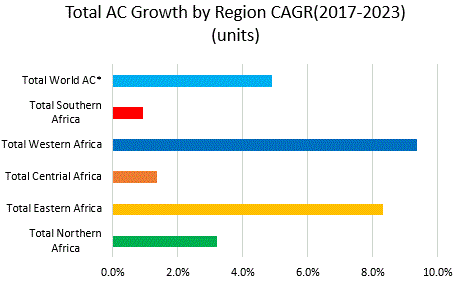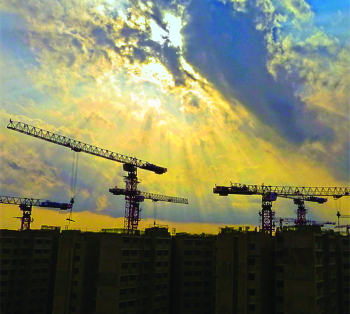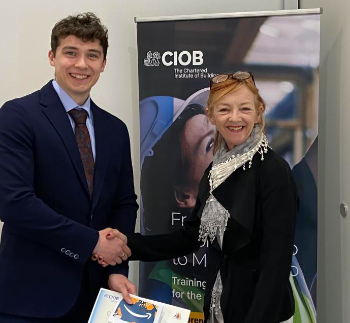Africa tops world AC growth forecasts

|
In 2018, the total African aircon (AC) market for the continent grew by 4% in volume from 2017. The market is forecast to grow at a compound annual growth rate (CAGR) of around 5.5% between 2017-2023 by volume, which exceeds the global forecast of 4.9% for the same period. This is according to the first-ever African air conditioning study released by BSRIA.
The countries with the strongest growth forecast are Ghana, Kenya, Nigeria and Tanzania. The main drivers are growth in population, better performing economies, more stable governments, new construction, urbanisation and rising disposable income.
There are still a myriad of challenges faced by the countries in the region, including a recovering economy in Egypt with strong growth in construction and a planned new capital city; economic stagnation in the run-up to the passing of the ‘Expropriation Bill’ in South Africa; shortage of foreign currency in Ethiopia and economic reforms in Tanzania restricting imports, as well as tough economic conditions challenging the growth of the Tunisian AC market.
Many African countries are looking to ‘diversify and develop’ their economies. This should help them to cope with ‘the storms of global trade wars and protectionism’ which currently threaten the world.
Saziye Dickson, BSRIA research manager (Air Conditioning, Ventilation and Refrigeration, Worldwide Market Intelligence) said: “In spite of its political uncertainty and economic challenges, the continent continues to attract investors’ attention, especially from China. Chinese interest is evident with Chinese AC manufacturers accounting for a significant market share in 2018, followed by the South Korean players.
“The main reason behind the growing interest in the region is its strong economic growth. According to the latest Oxford Economics forecast, GDP growth for Africa is set to outstrip that of any other world region from 2012 to 2030. This is driven by rapid economic and population growth, resulting in faster urbanisation than any other continent over this period.
“BSRIA’s strong relationship with global HVAC manufacturers and its expert researchers enable the company to provide valuable insight into market dynamics, as well as reliable market sizing and forecasts.
“The annual sale of 2.8m units per year mostly consists of single un-ducted splits which enjoy the strongest forecasted growth (6%) due to demand from residential and light commercial projects. The VRF sector (4% growth) is the second-fastest growth area in Africa.
“It is still early days as contractors and installers are slowly trained regarding these systems and the industry needs more specialist knowledge to make the right choices in selecting a HVAC system. The growth of 3% CAGR (2017 – 2023) in the chiller market is matching the growth levels of the Americas and the European AC market.
“The research also found that most global HVAC manufactures are present through independent dealers instead of having a presence with their own sales offices. However, this is slowly changing as companies figure out their entry strategy into these markets. This investment should help to develop growth in the AC sector, as marketing and sales spend starts to drive the market.”
The study covers 10 key country markets in detail and offers the HVAC industry a “much-needed” total African market data by estimating the remaining countries in a further five separate regions.
The regions: Central Africa, Eastern Africa, North Africa, Southern Africa and Western Africa.
The countries: Algeria, Egypt, Ethiopia, Ghana, Kenya, Morocco, Nigeria, South Africa, Tanzania and Tunisia.
More details on the size, trends and key issues in the Africa and Middle-Eastern AC markets are available from tina.fahmy@bsria.co.uk
EMEA sales enquiries: BSRIA UK: wmi@bsria.co.uk ¦ +44 (0) 1344 465 540 www.bsria.co.uk
America sales enquiries: BSRIA USA: sales@bsria.com ¦ +1 312 753 6800 www.bsria.com
China sales enquiries: BSRIA China: bsria@bsria.com.cn ¦ +86 10 6465 7707 www.bsria.com.cn
This article was authored by BSRIA's Worldwide Market Intelligence (WMI) division and first appeared on the BSRIA website in February 2019.
BSRIA is a non-profit distributing, member-based association providing specialist services in construction and building services. More information at www.bsria.co.uk.
Other articles by BSRIA can be seen here
--BSRIA
[edit] Related articles on Designing Buildings Wiki
- Air conditioning.
- Air conditioning inspection.
- Air conditioning inspection procedure.
- BSRIA completes 2021 World Air Conditioning market studies.
- BSRIA: new Global Air Conditioning Market Studies.
- Global air conditioning Study 2016.
- Ground pre-conditioning of supply air.
- Heating, ventilation and air conditioning.
- Smart connected HVAC market.
- World air conditioning market study 2015.
Featured articles and news
CLC and BSR process map for HRB approvals
One of the initial outputs of their weekly BSR meetings.
Building Safety Levy technical consultation response
Details of the planned levy now due in 2026.
Great British Energy install solar on school and NHS sites
200 schools and 200 NHS sites to get solar systems, as first project of the newly formed government initiative.
600 million for 60,000 more skilled construction workers
Announced by Treasury ahead of the Spring Statement.
The restoration of the novelist’s birthplace in Eastwood.
Life Critical Fire Safety External Wall System LCFS EWS
Breaking down what is meant by this now often used term.
PAC report on the Remediation of Dangerous Cladding
Recommendations on workforce, transparency, support, insurance, funding, fraud and mismanagement.
New towns, expanded settlements and housing delivery
Modular inquiry asks if new towns and expanded settlements are an effective means of delivering housing.
Building Engineering Business Survey Q1 2025
Survey shows growth remains flat as skill shortages and volatile pricing persist.
Construction contract awards remain buoyant
Infrastructure up but residential struggles.
Home builders call for suspension of Building Safety Levy
HBF with over 100 home builders write to the Chancellor.
CIOB Apprentice of the Year 2024/2025
CIOB names James Monk a quantity surveyor from Cambridge as the winner.
Warm Homes Plan and existing energy bill support policies
Breaking down what existing policies are and what they do.
Treasury responds to sector submission on Warm Homes
Trade associations call on Government to make good on manifesto pledge for the upgrading of 5 million homes.
A tour through Robotic Installation Systems for Elevators, Innovation Labs, MetaCore and PORT tech.
A dynamic brand built for impact stitched into BSRIA’s building fabric.
BS 9991:2024 and the recently published CLC advisory note
Fire safety in the design, management and use of residential buildings. Code of practice.
























